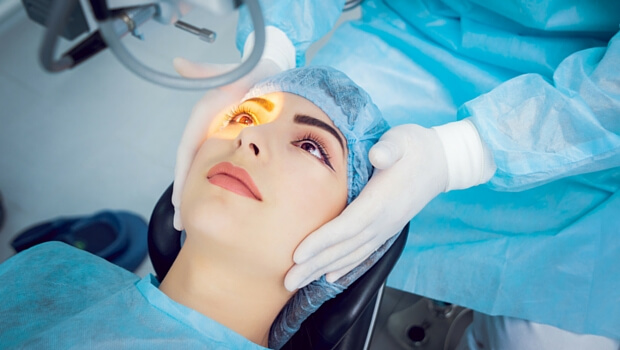
If you’ve ever played around with the photo-editing options on your smartphone, you know how amazing a slightly blurry filter can make your skin look. Any noticeable pores, wrinkles, and fine lines seem to disappear! But while a bit of blurriness can be a good thing in photos, it’s probably not something you want to experience in everyday life, no matter how good it might make your skin appear.
However, about 24 million people are dealing with blurry vision in the form of cataracts. In fact, by the time the average American reaches the age of 80, it’s more likely than not they will either have a cataract or have undergone cataract surgery. Cataracts occur when proteins build up on the lens and cloud it. There are a number of factors that contribute to this buildup, including age, genetics, medical conditions like diabetes or glaucoma, cigarette smoke, pollution, alcohol consumption, and exposure to radiation, whether from cancer treatment or too much time in the sun.
Fortunately, there are steps you can take to reduce your risk of developing cataracts, including avoiding the preventable factors listed above. And one of the better things you can do is to consume a diet high in a particular nutrient. And even better news is that you’ll recognize this nutrient as being one that’s also beneficial for your skin, so even with your eagle-eye vision, your face will also look great.
Researchers at King’s College in London had the opportunity to conduct a large study of twins in the UK. Twin studies are especially insightful because they help us separate issues of nature versus nurture. When two people with the same genes experience different health outcomes, it’s likely that a lifestyle choice played a significant part in the divergence. This particular study followed more than 1,000 pairs of female twins over the course of 10 years. The researchers asked the participants to fill out food questionnaires at regular intervals and checked their eyes for cataracts using digital imaging at the beginning of the study and the end.
Banish Puffy Eyes!
This gravity-defying cream contains over 30 ingredients, including an Essential Fatty Acid Complex, Sandalwood and Barley Extracts to help rehydrate, reduce puffiness, and help minimize the appearance of lines and wrinkles.
Learn More Now
The food questionnaires tracked the participants’ consumption of vitamins A, B, C, D, and E, along with copper, manganese, and zinc. One of these stood out as a powerhouse. So much so that those who consumed the most were 20% less likely to have cataracts at the beginning of the study. They also had a 33% reduced risk of cataract progression by the end if they did start out with the issue.
If you’ve been a reader for long, you’ve likely spotted one of my favorite nutrients for your skin on the list: vitamin C. Sure enough, this was the superstar that decreased cataract risk. The researchers suspect that this is because high levels of vitamin C in the fluid around the lens can help prevent the oxidation process that can cloud it. Vitamin C functions as an antioxidant, so it mops up detrimental free radicals.
The researchers concluded that genetic factors accounted for just 35% of the differences in cataract progression. Environmental factors made up the other 65%. The authors of the study concluded that vitamin C, in particular, “protected against cataract progression.” But it wasn’t just protective against cataract progression, it also was protective against the onset of cataracts. So there’s quite a bit you can do to protect your eyes, even if you’re genetically predisposed to cataracts.
Eating vitamin C foods will benefit your skin and your eyes. Many of my patients squeeze 1/2 of a lemon into warm or hot water and drink this first thing in the morning. That is starting the day with a good shot of vitamin C. Vitamin C topically for your skin – won’t help your eyes, but will do wonders for your skin.
Better Health and Living for Women,

Janet Zand
Source:
http://www.ncbi.nlm.nih.gov/pubmed/27016950